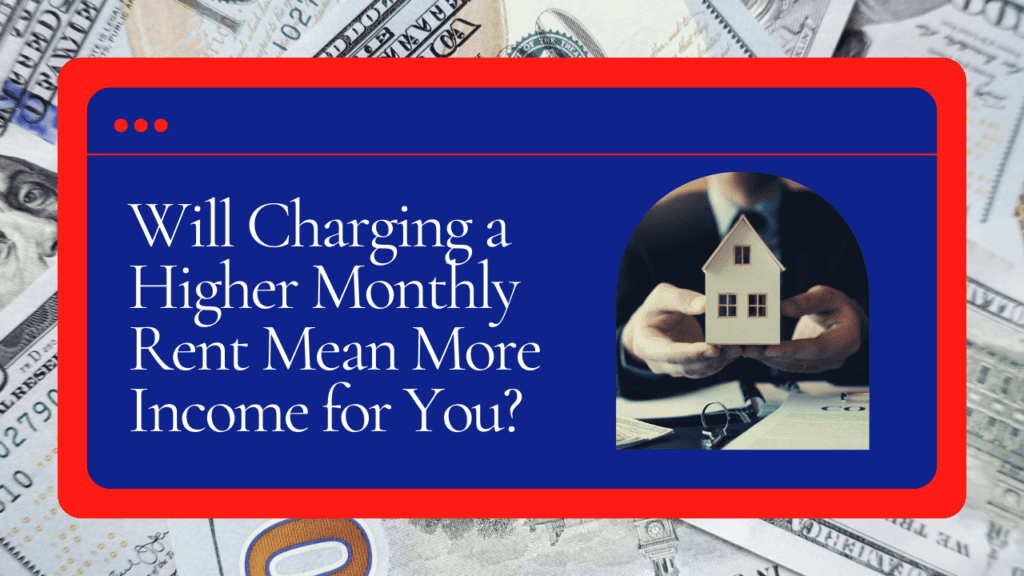 It seems like charging more in rent will immediately lead to more income for rental property owners.
Sometimes, it works out this way.
But not always.
You should absolutely charge more rent if the market supports an increase. If it doesn’t, however, asking for higher rents can lead to longer vacancies. That’s going to be a huge drain on your cash flow and your ROI, leading to less income rather than more.
Here’s how to know when you can and should charge more in rent.
It seems like charging more in rent will immediately lead to more income for rental property owners.
Sometimes, it works out this way.
But not always.
You should absolutely charge more rent if the market supports an increase. If it doesn’t, however, asking for higher rents can lead to longer vacancies. That’s going to be a huge drain on your cash flow and your ROI, leading to less income rather than more.
Here’s how to know when you can and should charge more in rent.
Conduct a Close Market Analysis
Don’t charge a higher rent if the market doesn’t allow for it. Experienced investors understand that it doesn’t matter how much you want or need to earn. Rental values are market-driven. While location, property condition, property size, and available amenities will always have an impact on what you can charge, the bottom line is the market and the existing competition. Make sure you can access good data before you set or increase your rent. Talk to property managers who can tell you what similar homes are renting for right now. That’s the best way to decide if you’ll be able to earn more money with higher rents. If you’re $100 or $200 below what the market is calling for, you should absolutely raise those rents, and you will end up earning more. However, if you’re already at the top of the market in terms of what you’re charging, asking for more will only alienate good tenants.Avoiding Vacancy and Turnover
 Tenant retention will increase your income. Avoiding vacancy will also increase your income. These are important considerations when you’re thinking about charging more in rent.
Earning $2,800 a month instead of $2,600 a month seems attractive. But if you can’t get a tenant in place for two months at that higher rental price, you’re losing more than $5,000 a year. Think about that math. Keeping the rent at $2,600 but filling the vacancy right away will give you far more income than charging $2,800 but losing two months of rent.
You have to think the same way when it comes to rental increases at renewal time. Do you really want to risk losing your current tenant? Most residents will anticipate their rent going up a little when they renew. But, a large increase will give them a good reason to look elsewhere.
Turnover costs are expensive. You’ll need to find a new tenant and before you do that, you’ll have to make repairs and cosmetic improvements to the property. You’ll need to pay to keep the utilities on and you’ll have to clean the home and make sure it’s secure while no one is living in it.
All of that adds up to a lot of money and a large loss. You don’t want to over-charge your existing tenants at renewal time, especially if they know they have better and less expensive options elsewhere.
You want to earn as much as possible on your investment property. But don’t fall into the trap of thinking that the only way to do that is with higher rents. There are other ways to earn more, and we can help you. Contact our team at HCM Property Management.
Tenant retention will increase your income. Avoiding vacancy will also increase your income. These are important considerations when you’re thinking about charging more in rent.
Earning $2,800 a month instead of $2,600 a month seems attractive. But if you can’t get a tenant in place for two months at that higher rental price, you’re losing more than $5,000 a year. Think about that math. Keeping the rent at $2,600 but filling the vacancy right away will give you far more income than charging $2,800 but losing two months of rent.
You have to think the same way when it comes to rental increases at renewal time. Do you really want to risk losing your current tenant? Most residents will anticipate their rent going up a little when they renew. But, a large increase will give them a good reason to look elsewhere.
Turnover costs are expensive. You’ll need to find a new tenant and before you do that, you’ll have to make repairs and cosmetic improvements to the property. You’ll need to pay to keep the utilities on and you’ll have to clean the home and make sure it’s secure while no one is living in it.
All of that adds up to a lot of money and a large loss. You don’t want to over-charge your existing tenants at renewal time, especially if they know they have better and less expensive options elsewhere.
You want to earn as much as possible on your investment property. But don’t fall into the trap of thinking that the only way to do that is with higher rents. There are other ways to earn more, and we can help you. Contact our team at HCM Property Management.

